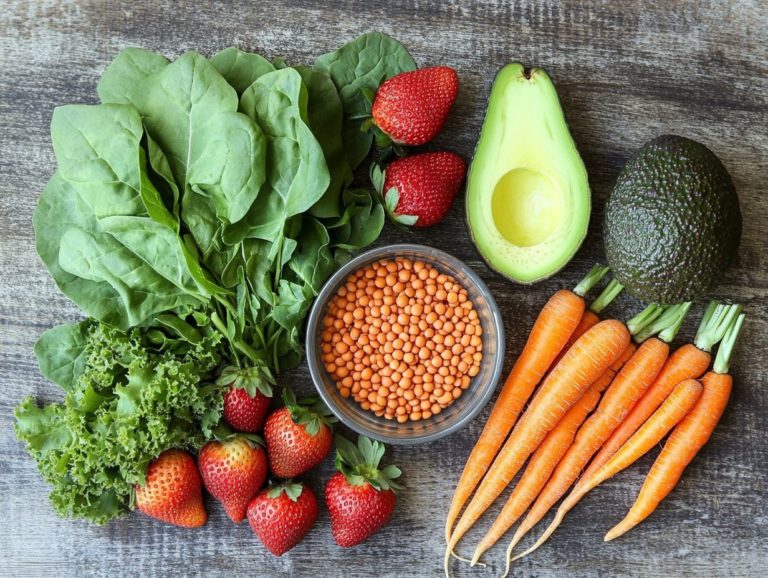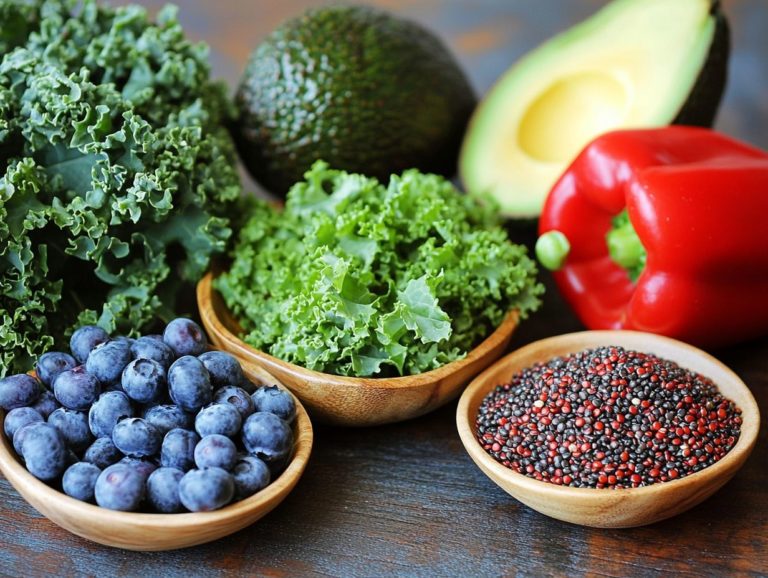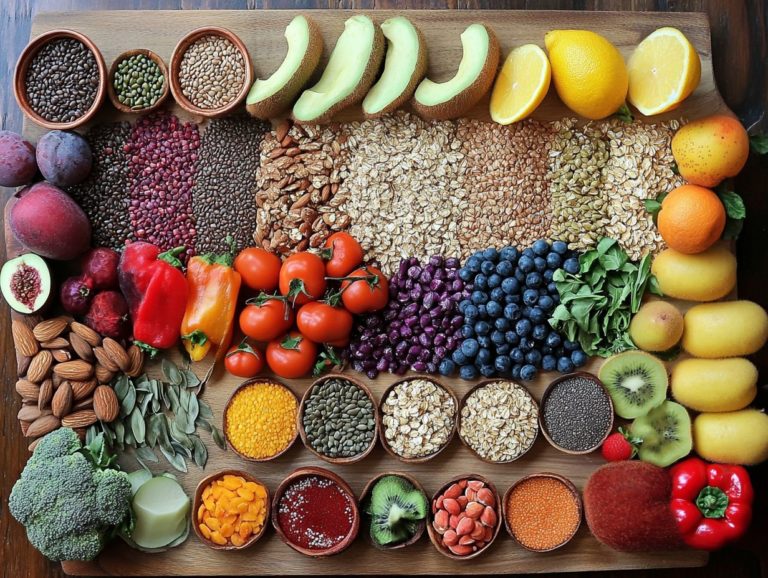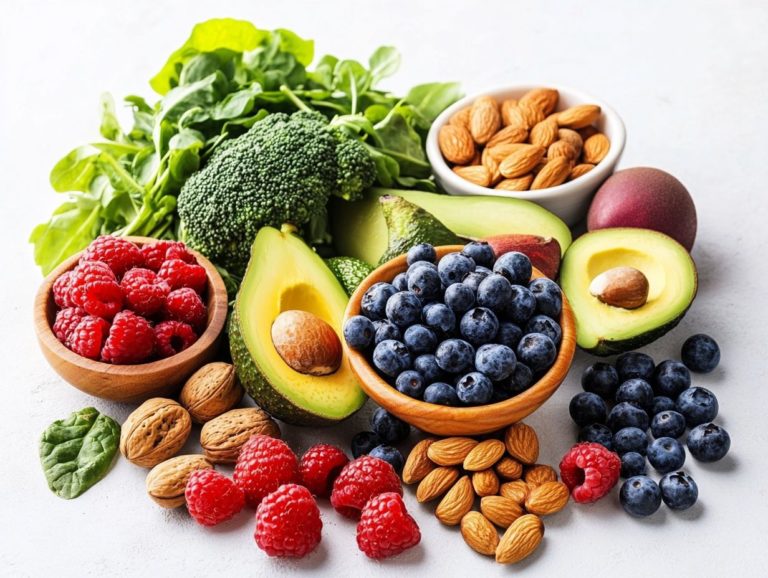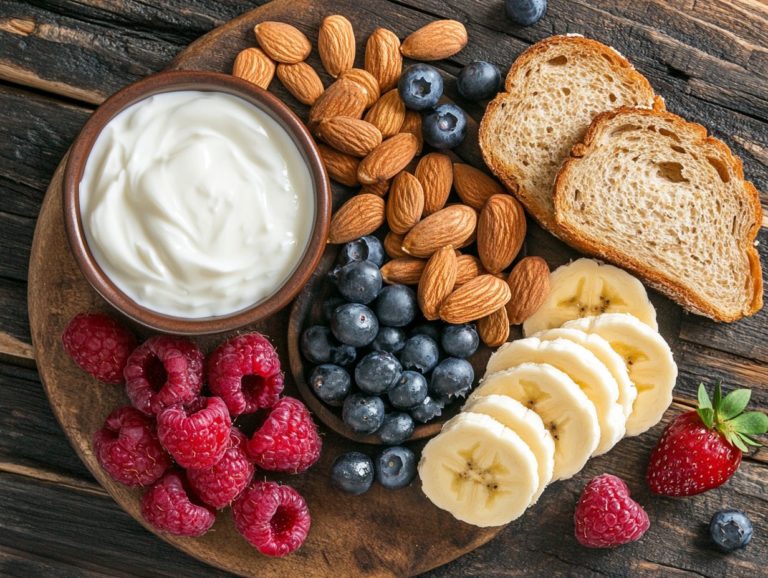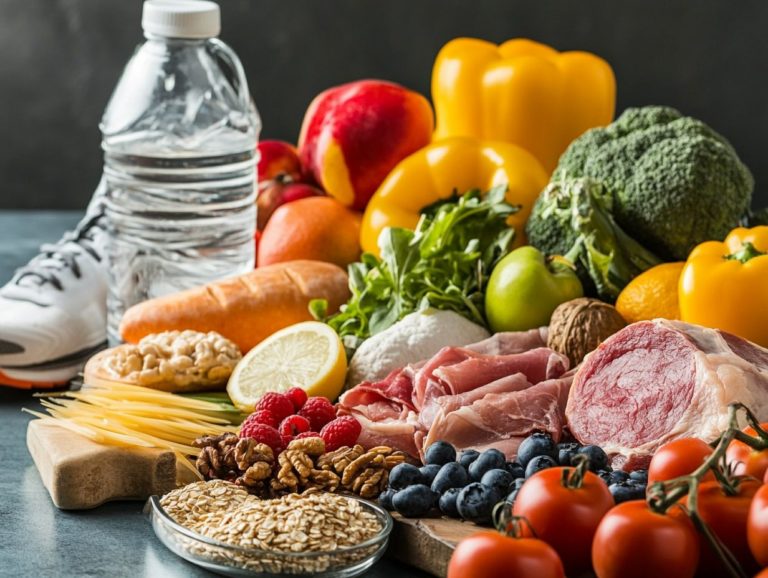Foods That Naturally Boost Your Iron Levels
Iron is an essential nutrient that significantly contributes to your overall health. Yet, many individuals struggle with its deficiency. Don t wait! Start boosting your iron levels today for better energy and health!
This article explores the many causes and symptoms of iron deficiency, emphasizing the vital role iron plays in your body.
You will also discover the best food sources both plant-based and animal-based along with supplements and fortified options designed to increase your intake.
Moreover, you ll find practical tips for maximizing iron absorption and learn effective strategies to elevate your iron levels, ultimately enhancing your well-being.
Contents
- Key Takeaways:
- Understanding Iron Deficiency
- The Importance of Iron in the Body
- Top Foods for Boosting Iron Levels
- Other Ways to Increase Iron Intake
- Tips for Absorbing Iron Efficiently
- Preguntas Frecuentes
- Cu les son algunos alimentos que aumentan naturalmente tus niveles de hierro?
- Por qu es importante mantener niveles adecuados de hierro en el cuerpo?
- Se pueden incorporar f cilmente los alimentos que aumentan naturalmente los niveles de hierro en una dieta vegetariana o vegana?
- Existen alimentos que pueden inhibir la absorci n de hierro?
- C mo puedo saber si tengo niveles bajos de hierro?
- Se pueden usar suplementos de hierro como sustituto de los alimentos ricos en hierro?
Key Takeaways:
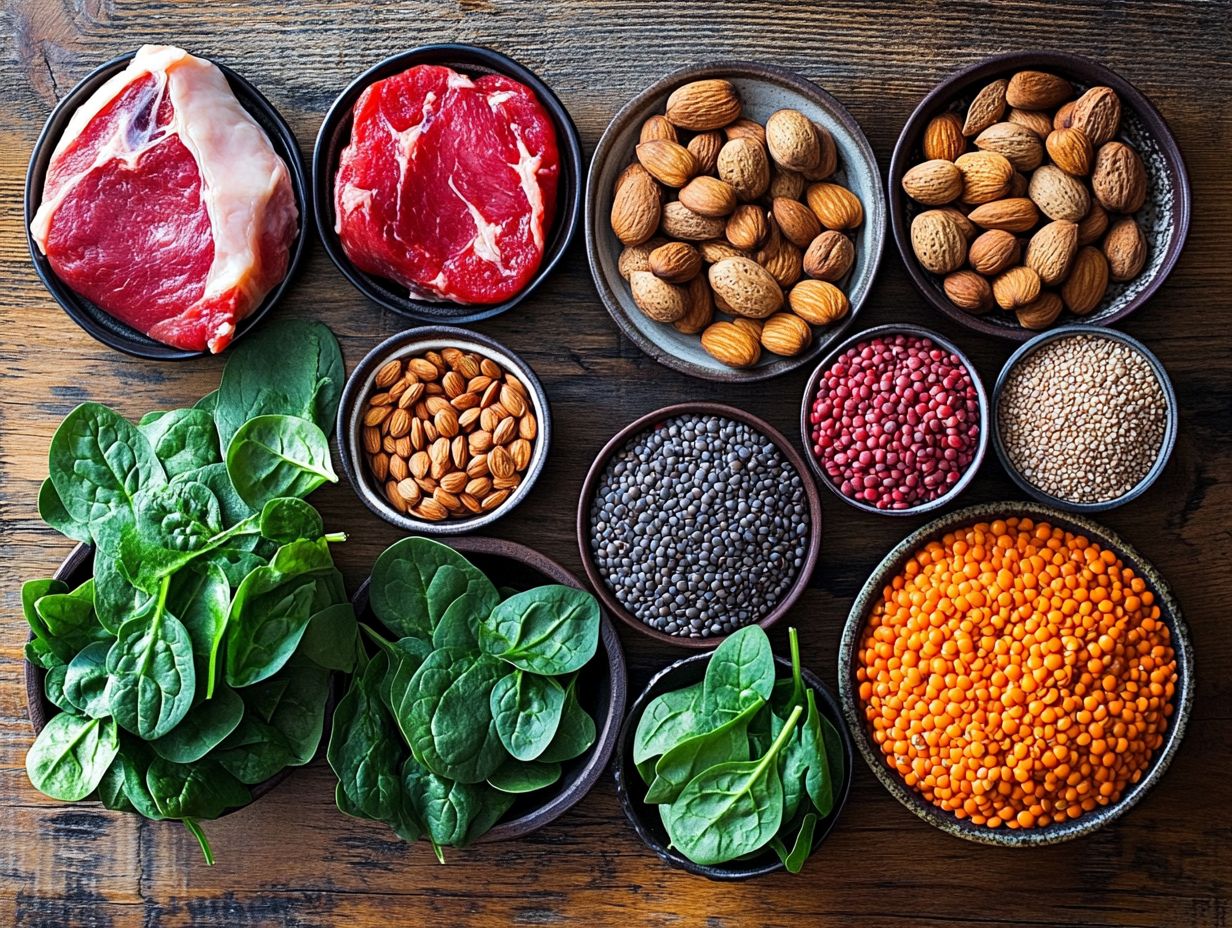
Eat a variety of iron-rich foods from both plant and animal sources to naturally boost your iron levels. Include vitamin C-rich foods in your meals to help enhance the absorption of iron from your diet. If you are unable to meet your iron needs through diet alone, consider taking iron supplements or consuming fortified foods to increase your iron intake.
Understanding Iron Deficiency
Iron deficiency is a widespread concern impacting millions around the globe. Understanding its implications is essential for maintaining optimal iron levels and overall health.
When your body lacks sufficient iron, it can lead to iron deficiency anemia, which reduces the production of hemoglobin a protein in your blood that carries oxygen. This deficiency may arise from inadequate dietary intake, absorption challenges, or increased physiological needs during pregnancy or growth spurts.
Recognizing the symptoms, causes, and potential health benefits of addressing iron deficiency is vital for anyone looking to enhance their dietary habits and improve their well-being.
Causes and Symptoms
The causes of iron deficiency anemia can vary significantly, from insufficient iron intake to increased iron demands during growth spurts or pregnancy.
Several factors may contribute to this condition, such as poor dietary choices, gastrointestinal issues that impair iron absorption, and blood loss from heavy menstruation or internal bleeding.
If you find yourself struggling with symptoms like persistent fatigue, weakness, and a noticeable pallor in your skin, it s crucial to recognize the importance of adequate iron intake, especially if you have specific dietary needs.
When your body doesn’t receive enough iron, it struggles to produce hemoglobin, leading to a series of health complications that extend beyond simple tiredness, ultimately affecting your overall well-being.
The Importance of Iron in the Body
Iron plays a pivotal role in various physiological functions within your body, making it essential for maintaining overall health and well-being.
It s primarily involved in forming hemoglobin, which is crucial for transporting oxygen from your lungs to your tissues. Additionally, iron is integral to cellular metabolism and energy production.
Your body absorbs two forms of iron: heme iron from animal products and non-heme iron from plant-based sources. Knowing how iron works in your body makes it clear why you need to meet your daily iron needs!
Functions and Benefits
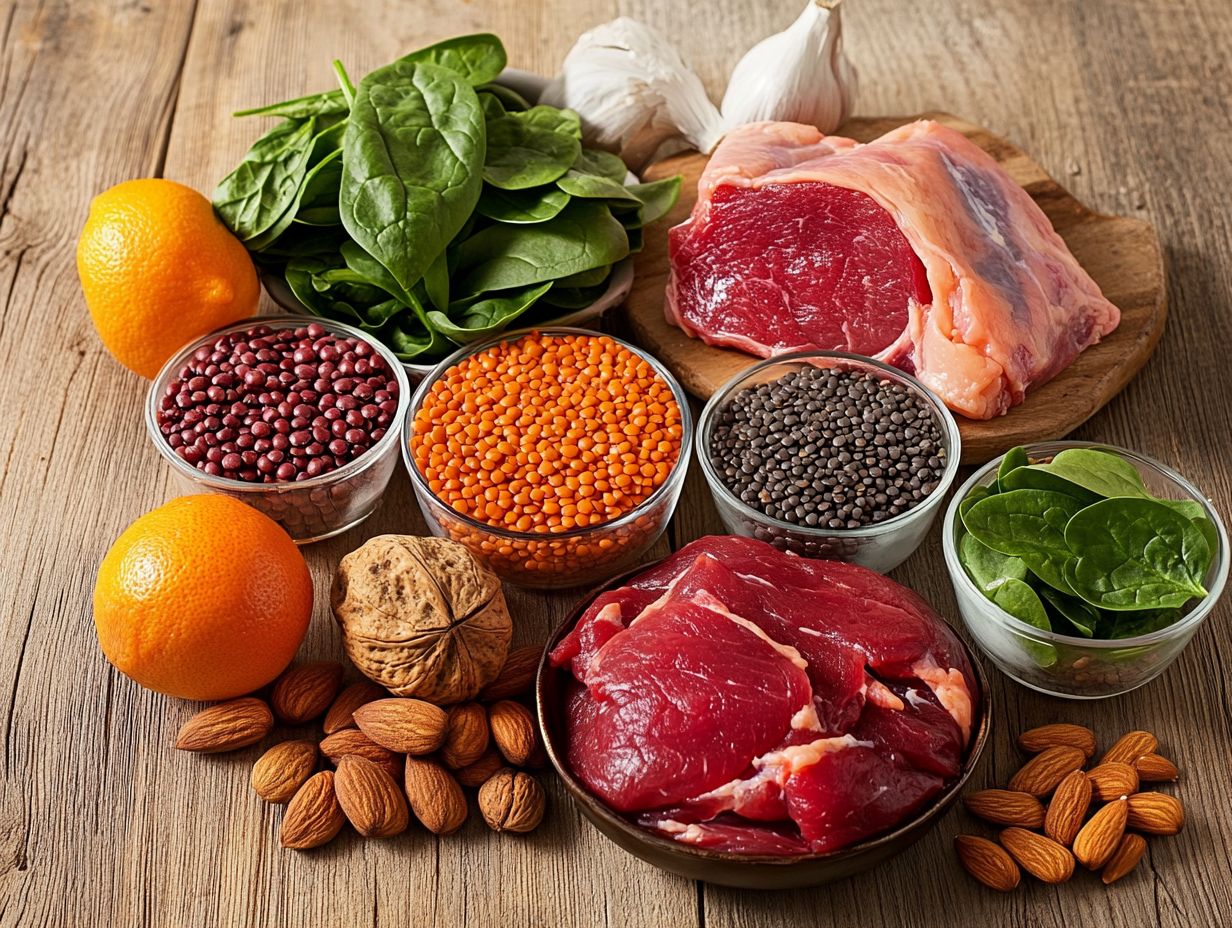
Iron is essential for numerous bodily functions, including oxygen transport, immune support, and cognitive performance.
This vital mineral ensures that oxygen is efficiently delivered throughout your bloodstream to various tissues, which is fundamental for sustaining your energy levels throughout the day.
When your iron levels are optimal, you re likely to notice enhanced concentration and mental clarity, directly benefiting your overall cognitive health. Iron also strengthens your immune system, helping your body fight off infections and diseases effectively.
Conversely, a deficiency can lead to fatigue and cognitive decline. It s crucial to maintain adequate iron intake if you want to preserve not just your physical health but also your mental sharpness and resilience.
Assess your iron intake and consult with a healthcare provider if you suspect you have a deficiency.
Top Foods for Boosting Iron Levels
Incorporating a range of iron-rich foods into your diet is crucial for enhancing your iron levels and meeting your daily requirements.
You can categorize these foods into two types based on their iron content: haem iron, which comes from animal sources and is easier for your body to absorb, and non-haem iron, sourced from plant-based options.
It’s wise to seek a variety of sources, including:
- Red meat
- Poultry
- Seafood
- Legumes
- Dark leafy greens
Following this approach not only helps improve your overall iron absorption but also plays a role in preventing iron deficiency anemia.
Plant-Based Sources
Plant-based sources of iron are plentiful and offer a delightful array of non-haem iron-rich foods that can significantly enhance your daily intake.
Consider legumes like lentils, chickpeas, and black beans. They’re excellent choices that pack a substantial iron punch while also delivering protein and fiber.
Don’t overlook dark leafy vegetables, such as spinach and kale. These provide not only iron but also a treasure trove of vitamins and minerals that contribute to your overall well-being.
Fortified grains, including select cereals and bread, present another fantastic opportunity to elevate your iron levels while enjoying a satisfying meal.
Incorporating these foods into your daily menu can be as simple as adding a handful of spinach to your smoothie or tossing legumes into your soups and salads, enriching both your nutrition and flavor profile.
Animal-Based Sources
Animal-based sources of iron provide you with haem iron, which your body absorbs more efficiently, making them an essential part of a well-rounded diet.
Consider indulging in iron-rich meats like:
- Beef
- Lamb
- Pork
As well as poultry options, such as:
- Chicken
- Turkey
Don’t forget fish; varieties like tuna, salmon, and sardines significantly enhance your iron intake.
The way you cook these foods can boost iron absorption too. Grilling or broiling meat not only adds flavor but also breaks down cell walls, making the iron even more bioavailable.
Try marinating your seafood or meats in citrus juices for better absorption and delicious flavors!
Other Ways to Increase Iron Intake
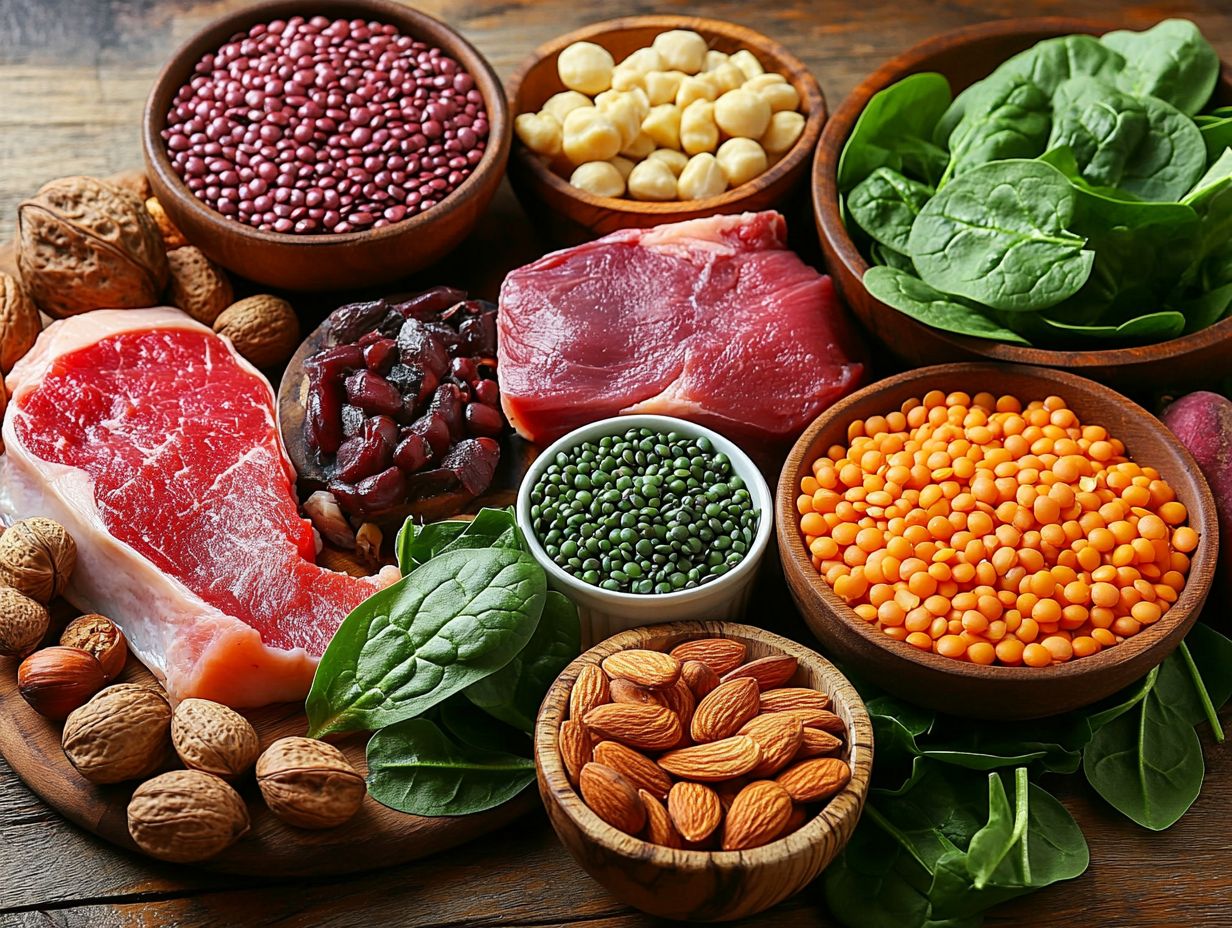
Along with incorporating dietary sources, you can use several strategies to elevate your iron intake.
Consider utilizing iron supplements or opting for fortified foods specifically designed to align with your individual dietary guidelines.
Supplements and Fortified Foods
Iron supplements can serve as an effective solution for addressing deficiency, particularly for individuals with higher needs or absorption challenges. These supplements come in various forms, including ferrous sulfate, ferrous gluconate, and ferrous fumarate, each offering distinct advantages and differing levels of elemental iron.
If you’re experiencing fatigue or a dip in immunity, these options may help restore your energy and bolster your overall health. However, be aware of potential side effects, such as gastrointestinal discomfort or constipation, which can sometimes accompany iron supplementation.
Incorporating fortified foods, like iron-enriched cereals, into your daily diet can provide a valuable source of this essential mineral. This holistic approach not only elevates your iron levels but also ensures a well-rounded nutritional intake.
Tips for Absorbing Iron Efficiently
Improving your iron absorption is crucial for reaping the benefits of iron-rich foods and preventing iron deficiency anemia.
One effective strategy is to pair your iron-rich meals with sources of vitamin C, which significantly enhances non-haem iron absorption. Moreover, be mindful of your cooking methods, as they can influence both the iron content and bioavailability of your meals.
Incorporating these practices into your meal preparation can make a notable difference in your overall iron intake. Start making these changes today for better health!
Boost Your Iron Absorption Now!
To enhance iron absorption in your diet, use specific food pairing strategies. These methods can make a big difference.
One of the most effective methods is combining plant-based iron sources with vitamin C-rich foods. This powerful vitamin can truly transform how well your body absorbs iron.
For instance, by including bell peppers, oranges, or strawberries alongside meals featuring legumes or leafy greens, you can achieve a remarkable increase in iron bioavailability.
Dietary guidelines show that these combinations can help you maximize the benefits of your meals. This is especially important if you re at risk of deficiency.
Preguntas Frecuentes
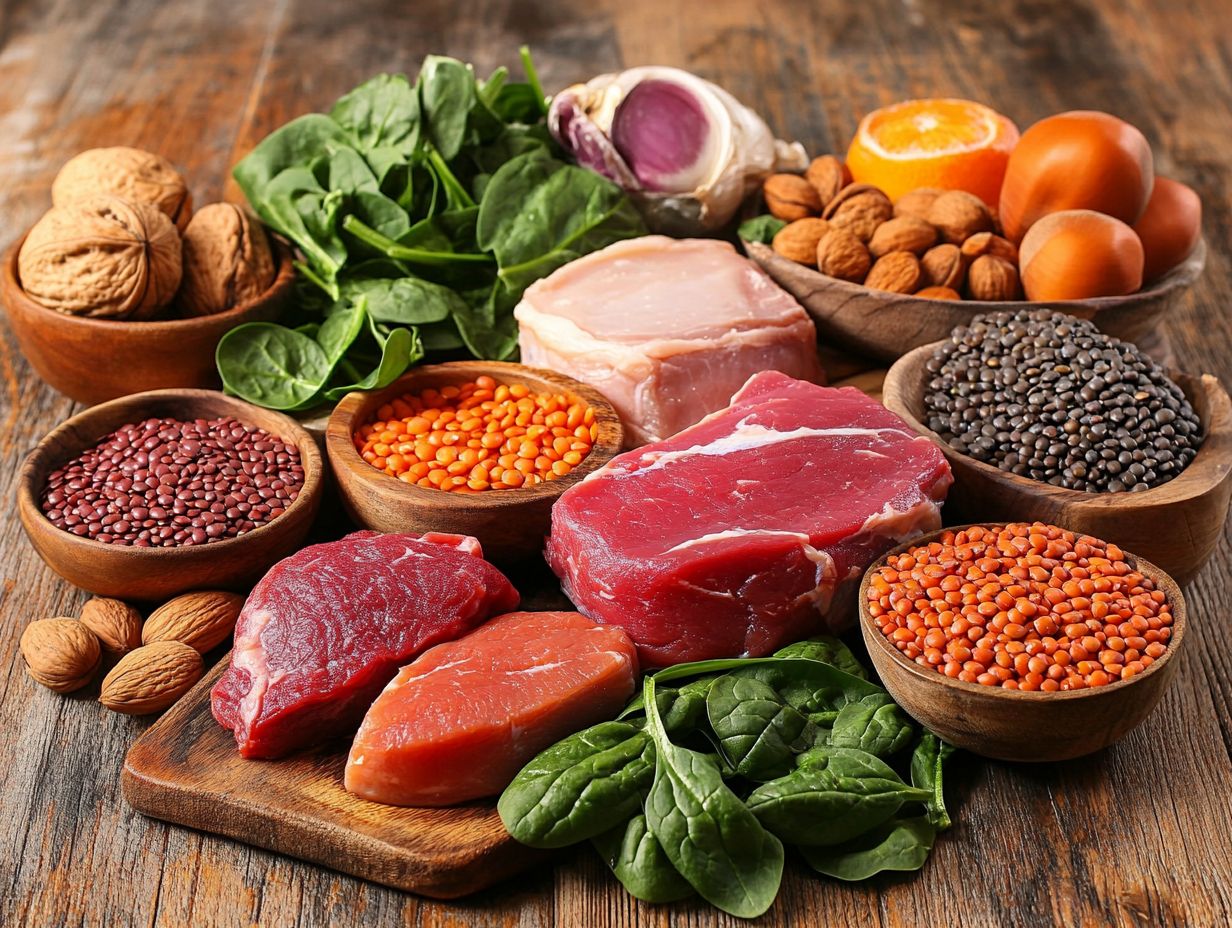
Cu les son algunos alimentos que aumentan naturalmente tus niveles de hierro?
Algunos alimentos ricos en hierro que pueden aumentar naturalmente tus niveles de hierro incluyen verduras de hojas oscuras, carne roja, frijoles y lentejas, tofu, cereales de desayuno fortificados y frutas secas.
Por qu es importante mantener niveles adecuados de hierro en el cuerpo?
El hierro es un mineral esencial que juega un papel vital en la producci n de gl bulos rojos, que transportan ox geno por todo el cuerpo. Los niveles adecuados de hierro son necesarios para la producci n de energ a y para prevenir la anemia por deficiencia de hierro.
Se pueden incorporar f cilmente los alimentos que aumentan naturalmente los niveles de hierro en una dieta vegetariana o vegana?
S , hay muchas fuentes vegetales de hierro, como legumbres, verduras de hojas, granos enteros y alimentos fortificados que se pueden incorporar en una dieta vegetariana o vegana para aumentar los niveles de hierro.
Existen alimentos que pueden inhibir la absorci n de hierro?
S , algunos alimentos pueden inhibir la absorci n de hierro, como los productos l cteos, el t , el caf y los alimentos ricos en calcio o fitatos. Es mejor consumir estos alimentos por separado de los alimentos ricos en hierro para maximizar la absorci n de hierro.
C mo puedo saber si tengo niveles bajos de hierro?
Common signs of low iron include fatigue, weakness, pale skin, shortness of breath, and dizziness. If you notice any of these, consult a healthcare professional immediately!
Se pueden usar suplementos de hierro como sustituto de los alimentos ricos en hierro?
Si bien los suplementos de hierro pueden ser beneficiosos para aquellos con anemia por deficiencia de hierro, siempre es mejor obtener nutrientes de alimentos enteros siempre que sea posible. Una dieta equilibrada que incluya alimentos ricos en hierro es la forma m s efectiva de mantener niveles adecuados de hierro en el cuerpo.

